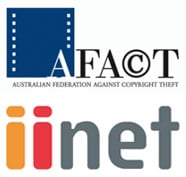TorrentFreak Email Update |
| iiNet: ISP Not Liable For BitTorrent Piracy, High Court Rules Posted: 19 Apr 2012 05:18 PM PDT
The case navigated several layers of the Australian court system, with iiNet winning the initial ruling and all subsequent appeals, before finally ending up in front the High Court in December last year. The thrust of the case hung on whether iiNet had willingly authorized the copyright infringements of its customers. Lower courts found that iiNet had no duty to police its own networks, even when AFACT supplied so-called proof of infringement by its customers. Just moments ago, the High Court unanimously dismissed AFACT’s final appeal. "The Court observed that iiNet had no direct technical power to prevent its customers from using the BitTorrent system to infringe copyright,” a summary of the Court’s findings read. “Rather, the extent of iiNet’s power to prevent its customers from infringing the appellants’ copyright was limited to an indirect power to terminate its contractual relationship with its customers.” The High Court further noted that the warning notices previously sent to iiNet by AFACT when the ISP’s customers allegedly infringed copyright “..did not provide iiNet with a reasonable basis for sending warning notices to individual customers containing threats to suspend or terminate those customers’ accounts.” Since the notices were inadequate, iiNet could not be considered to have authorized the infringements of its subscribers when it did not act on them. The High Court sits at the pinnacle of Australia’s legal system and its rulings cannot be appealed. Today’s decision forms a binding legal precedent on all lower Australian courts and will be taken into consideration by judges in countries with comparable legal systems such as India, Canada and the UK. All of this factored into the reasoning of AFACT and its chief sponsor the MPAA to take legal action against iiNet, as revealed by US diplomatic cables released by Wikileaks in November 2011. The US Ambassador to Australia in 2008, Robert McCallum, reported back to Washington that iiNet was chosen because it was judged too small to put up a decent legal fight. In the cable, the Ambassador prophetically cautioned the coming legal tussle could be perceived as “…the giant American bullies [versus] little Aussie battlers….” AFACT could never have known Wikileaks would out the plot, or that the legal case would so spectacularly backfire. Today’s decision will hurt Hollywood’s copyright enforcement agenda on multiple levels. Alongside the setting of a unwanted legal precedent, AFACT has been dealt a significant public relations blow in its ongoing lobbying efforts in Australia. Prior to the decision, AFACT’s Managing Director Neil Gane told TorrentFreak via email, “Regardless of the outcome [today], the landscape has changed. In the three years since the case commenced, legislators, regulators and courts around the world have recognized that ISPs must play a central role in preventing online copyright theft.” Anticipating a loss in the case, AFACT began lobbying government and ISPs behind closed doors last December. The process has been widely criticised for a lack of public consultation. While the Australian government has suggested it prefers an industry agreed model for combating copyright infringement to legislation, leaks have revealed AFACT and its lobbying partners have been pressuring for an outcome that forces ISPs into a policing role. The option of having ISPs forced into that role through the courts has been blunted by today’s High Court decision and it can be expected AFACT will step up their lobbying efforts of law-makers directly. iiNet will be holding a press conference on today’s ruling shortly – we will bring you details as they become available Source: iiNet: ISP Not Liable For BitTorrent Piracy, High Court Rules |
| RapidShare Publishes Anti-Piracy Manifesto for Cyberlockers Posted: 19 Apr 2012 07:24 AM PDT
As a company, RapidShare sees itself operating in the "cloud hosting" business, offering a service comparable to the likes of Dropbox. And since people are moving data from local drives to the cloud at an increasing rate, these companies will undoubtedly host some copyrighted material too. During the past several years RapidShare has made tremendous efforts to cooperate with copyright holders and limit copyright infringements. The Swiss-based company is trying to position itself as a front-runner when it comes to responsible dealings with copyright infringers. Emphasizing this role, the cyberlocker has just published an anti-piracy manifesto for cyberlockers, or a “responsible practices for cloud storage services” as they call it. "RapidShare has always embraced our obligation to protect the intellectual property and copyright interests of creators. Today's announcement takes that obligation to a new level," said RapidShare’s general counsel Daniel Raimer commenting on the release. The four page document is a summary of what RapidShare believes cyberlockers should do to assist copyright holders in preventing copyright infringements. While some of the suggestions are already baked into the US DMCA, several of the suggestions go above and beyond existing law, with inevitable consequences for the privacy of users. It includes basic recommendations such as making files private by default, but it also goes further by granting copyright holders the power to get account holders disconnected when they are merely suspected of copyright infringement. “Services should terminate account holders or subscribers not merely upon proof that they are infringers but when sufficient copyright holders have called their conduct into question,” RapidShare writes. Or in other words, account holders are guilty until proven innocent. In addition, RapidShare also makes it mandatory for account holders to use valid email addresses, so these can be shared with copyright holders when there’s a legal dispute. “Services should require valid e-mail addresses of subscribers and account holders in order for them to register new accounts. In the event a copyright holder seeks account holder information through valid legal procedures, the service should have access to valid e-mail address information to furnish in response, which may facilitate an inquiry to the e-mail service provider. “ The above is bad news for privacy loving anons, but there are more concerns on this front. RapidShare also suggests that all cyberlockers update their privacy policy to make it possible for them to inspect the personal files of those who are accused of copyright infringement. “Privacy policies should establish that service providers retain the right to inspect files of repeat accused infringers or accused violators of the service's terms of service who, after reasonable notice to them by the service provider, have made no good-faith counter notifications or efforts to justify their conduct as non-infringing or as not violating the service provider's terms of service.” Also, RapidShare recommends that cyberlockers operate from countries that respect copyright law. “Service providers should either reside in a country that belongs to the Hague Convention for the Service of Process Abroad or should voluntarily comply with requests to waive service of process with respect to subpoenas for user information. They should also reside in a jurisdiction that shows respect for copyright law.” In his announcement of the manifesto Raimer once again emphasized that his company is doing all it can to eradicate piracy. "We want all stakeholders in the debate over online copyright infringement [...] to understand that RapidShare recognizes that piracy is a serious problem, that we're reinforcing our efforts to eradicate it, and that we're calling on other data logistics companies to do the same," he said. The company itself goes even beyond its own recommendations, by monitoring third-party sites and forums that post links to infringing material on RapidShare. In addition, the cyberlocker also decreased the download speeds of free users to drive pirates away. Thus far the entertainment industry is quite content with RapidShare’s efforts, but whether the average RapidShare user is happy with these changes is doubtful. The ManifestoSource: RapidShare Publishes Anti-Piracy Manifesto for Cyberlockers |
| You are subscribed to email updates from TorrentFreak To stop receiving these emails, you may unsubscribe now. | Email delivery powered by Google |
| Google Inc., 20 West Kinzie, Chicago IL USA 60610 | |






 In the aftermath of the Megaupload shutdown, people have been keeping a close eye on other file-hosting services, RapidShare included.
In the aftermath of the Megaupload shutdown, people have been keeping a close eye on other file-hosting services, RapidShare included.
No comments:
Post a Comment